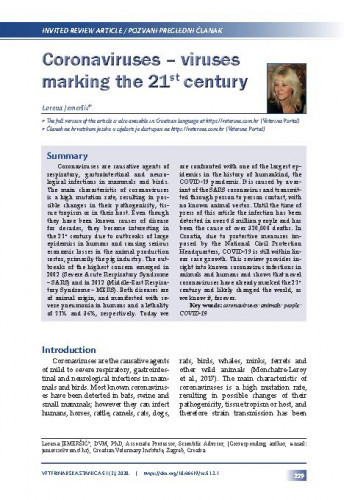Bolesti su kroz čitavu povijest imale veliki utjecaj na razvoj i prosperitet čovječanstva, pobuđivale su pozornost zbog masovnosti pojave, velike smrtnosti među oboljelima i dalekosežnih posljedica koje su prouzročile. Zbog straha od gubitka zdravlja i nestanka života, bolest i smrt oduvijek su bile čovjekove bitne preokupacije. Velike epidemije su tijekom povijesti odlučivale o sudbini pojedinih naroda, slabile su snagu moćnih i velikih sila, prouzročile glad i bijedu. Epidemije velikih boginja, kuge, malarije, sifilisa, kolere, pjegavog tifusa, lepre i tuberkuloze obilježile su povijesti i bile su stalni pratitelj stradanja, nesreća i patnji ljudi tijekom minulih stoljeća. U XX. stoljeću „španjolska gripa ‒ majka svih pandemija“ obilježila je početak stoljeća, a pred kraj tog stoljeća pojava AIDS-a, svojom pojavom i posljedicama prestrašila je svijet. I u novom tisućljeću bolesti predstavljaju veliku i stalnu prijetnju današnjem društvu i dalje su jedan od najvećih ubojica u svijetu. Danas od zaraznih bolesti godišnje umire približno 15 milijuna ljudi. Pojava pandemije s COVID-19, najveće epidemije u XXI. stoljeću u iznimno kratkom vremenu promijenila je svijet i svijet je na koljenima. Ne mimoilazi ni bogate i svjetski snažne države ni državnike. Taj strah svakako postaje veći i opravdaniji kada Svjetska zdravstvena organizacija napominje da je čovječanstvo u ozbiljnoj i strašnoj opasnosti. Jedno je sigurno, a to je da nas pojava epidemije različitih bolesti potakne na duboko razmišljanje o budućnosti koja u tom slučaju postaje neizvjesna, remeti naše planove, korigira i usporava ciljeve.; Throughout history, diseases have had a major impact on the development and prosperity of humankind. They arouse attention due to their mass occurrence, high mortality rates among the affected, and the far-reaching consequences caused. Due to the fear of loss of health and life, illness and death have always been an essential preoccupation for humans. During the past, great epidemics have decided the fate of individual nations, weakened the strength of large and powerful armies, caused hunger and misery. Epidemics of smallpox, plague, malaria, syphilis, cholera, epidemic typhus, and tuberculosis have marked history and been a constant companion to human suffering over many centuries. At the beginning of the 20th century there was the Spanish flu, called the „mother of all pandemics”, and by the end of the century, the appearance of AIDS frightened the world. It is clear that even in the new millennium, disease poses a strong and constant threat to society and continues to be one of the greatest killers in the world, with approximately 15 million people per year dying of infectious diseases today. The rapid appearance of the COVID-19 pandemic, the largest epidemic in the 21st century, has brought the world to its knees. Even wealthy nations and statesmen have not been bypassed. This fear is certainly becoming more justified with the assessment of the World Health Organization that humanity is in grave and terrible danger. One thing is certain: the occurrence of an epidemic prompts us to think deeply about the future, which quickly becomes uncertain, all plans disrupted, and goals shifted and slowed.
Sažetak

 Veterinarska stanica : 51,3(2020) / glavni i odgovorni urednik Marko Samardžija.
Veterinarska stanica : 51,3(2020) / glavni i odgovorni urednik Marko Samardžija.